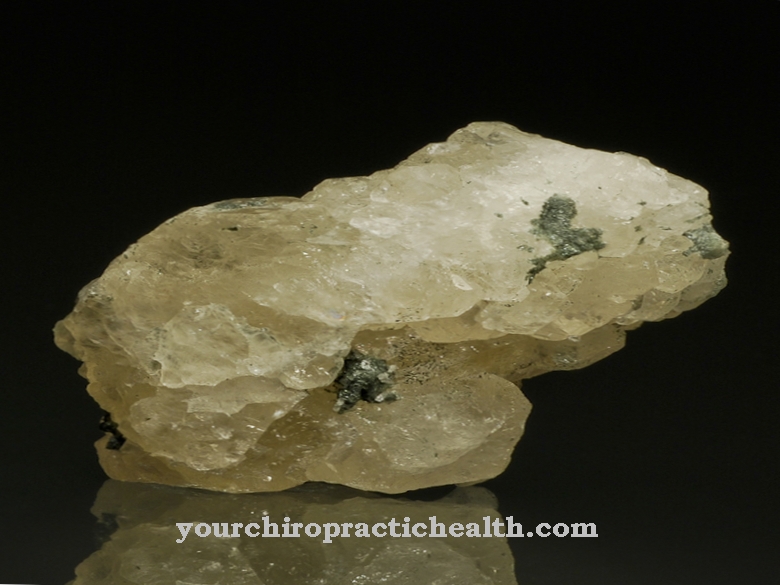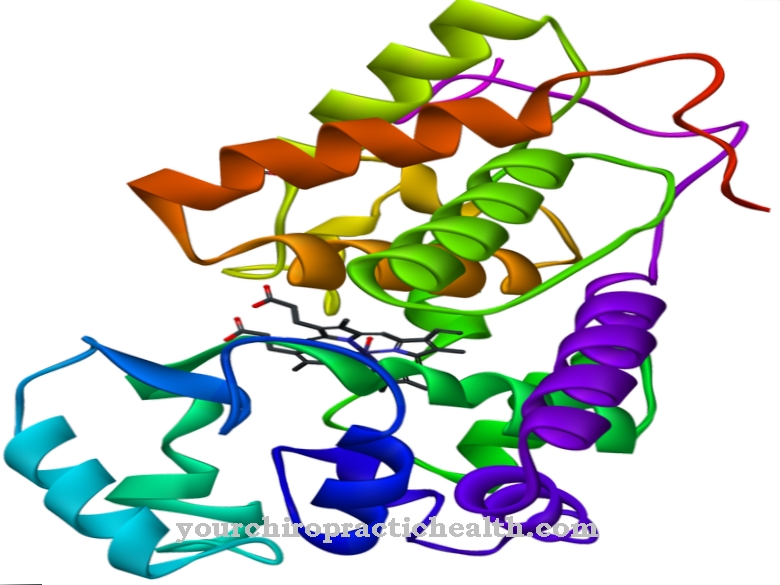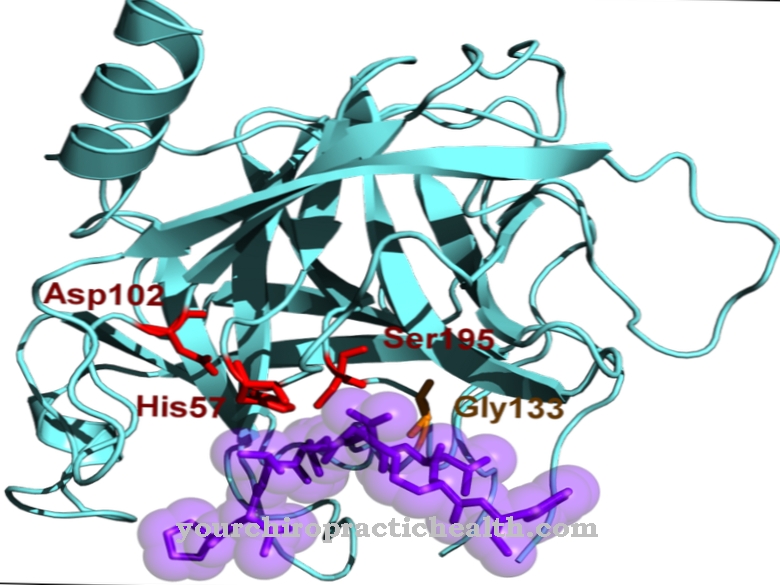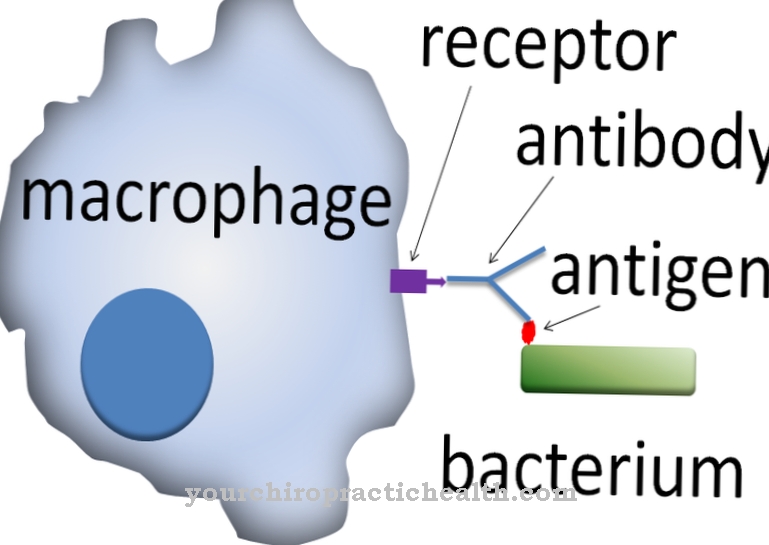Arginine in its L-form is an important semi-essential proteinogenic amino acid. It is the sole supplier of the neurotransmitter nitric oxide. A deficiency in arginine favors the development of arteriosclerosis and other so-called diseases of civilization.
What is arginine?
Arginine is the proteinogenic amino acid with the highest nitrogen content in the molecule. It is an optically active molecule, the L-shape of which is involved in protein synthesis.
When arginine is mentioned in the following it is always just that L-arginine meant. For the first time it was isolated as a silver salt. The name arginine comes from the Latin term for silver (argentum). Arginine is an alkaline amino acid. When dissolved in water, it always has an alkaline reaction. A hydrogen ion in the slightly dissociated water is bound by the guanidine nitrogen. In undissolved form, arginine represents an inner salt, since the proton of the acid group migrates to the more basic guanidino residue.
The guanidino group is always protonated in solution, regardless of whether it is in an acidic, neutral or basic medium. This tendency towards protonation gives proteins containing high amounts of arginine hydrophilic properties. This makes it easier for these proteins to be dissolved in water. In the metabolism, arginine is synthesized as part of the urea cycle.
Function, effect & tasks
Arginine takes on a variety of functions in the organism. First of all, it is a proteinogenic amino acid and a component of many proteins. Arginine-containing proteins have a basic reaction and are hydrophilic.
Furthermore, due to its richness in nitrogen in the molecule, arginine is the only source of the neurotransmitter nitric oxide. Nitric oxide (NO) is responsible for widening blood vessels. This ensures that the organs are adequately supplied with oxygen. The widening of the blood vessels reduces blood pressure and the body becomes more efficient with greater loads. Due to its vasodilating effect, arginine is widely used by strength athletes to strengthen performance and build muscle.
By strengthening performance, fat loss is also promoted. The positive effects of arginine contain, among other things, cardiovascular diseases or diabetes mellitus. It also inhibits platelet aggregation through the formation of NO, so that the development of thromboses is made more difficult. At the same time, erectile dysfunction is also positively influenced by the action of NO. Arginine takes on another function in the metabolism in the conversion of ammonia to urea. When amino acids are broken down, the toxic ammonia is produced as a breakdown product.
With the help of arginine, the body is detoxified by converting ammonia into urea. Arginine also has a positive effect on the immune system. Additional arginine supplementation improves the cellular immune response, especially in the case of severe injuries, infections or after operations. An increased phagocytosis is observed, whereby disturbances of the vascular function are prevented at the same time.
Education, occurrence, properties & optimal values
Arginine is synthesized in the organism and is therefore not one of the essential amino acids.It occurs as a metabolite in the urea metabolism and is also produced from other amino acids in the urea metabolism. However, there are situations in which there is an increased demand that cannot be met by higher production. This is particularly the case in the growing organism and in stressful situations.
That is why it is an essential amino acid for children and adolescents. For adults it is semi-essential, since the consumption often exceeds the formation in the body. Therefore, you should pay attention to a diet rich in arginine. Arginine is particularly common in nuts, fish (tuna, shrimp) and meat (chicken and lamb). In the case of high performance requirements, it can also be taken as a supplement. In old age and with diseases such as arteriosclerosis and cardiovascular diseases, the need for arginine increases again. The need also depends on the environmental conditions, which are noticeable in oxidative stress.
You can find your medication here
➔ Medicines for muscle weaknessDiseases & Disorders
Various studies prove the health-promoting effects of arginine. Arginine deficiency leads to an accelerated development of arteriosclerosis, diabetes mellitus, impotence and many other health disorders.
The immune system is also weakened. The most important factor in arginine's beneficial effects is its ability to produce nitric oxide (NO). In particular, the vasodilating properties of NO prevent atherosclerosis. This is due on the one hand to the better blood flow to the blood vessels and on the other hand to the inhibition of platelet aggregation. It has long been clear that additional administration of L-arginine leads to significant improvements in patients with early arteriosclerosis, vascular diseases, high blood pressure or erectile dysfunction.
Until recently, however, the European Food Safety Authority (EFSA) questioned the benefit of additional arginine supplementation in healthy people. According to the latest findings, the health value of arginine has also been confirmed in healthy people, especially in the context of the highest performance requirements. In addition to a healthy lifestyle, a diet rich in arginine has a preventive effect against degenerative diseases in old age. In later life, the concentration of asymmetric dimethylarginine (ADMA) increases by a factor of four. ADMA is the antagonist of arginine and breaks down nitric oxide.
It is produced during the methylation of arginine and is also known as the mortality factor because it accelerates the formation of arteriosclerosis and the diseases that result from it. The exact mechanism by which ADMA is formed is not yet known. In order to normalize the ratio of arginine to ADMA again, the arginine concentration must increase 40-fold. Additional doses of arginine can prevent or at least delay the development of arteriosclerosis. Arginine is also used to treat hyperammonaemia.
























.jpg)



